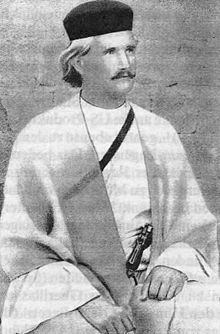View entry
Name: WASSMUSS, Wilhelm

Birth Date: 14 Feb 1880 Ohlendorf, Germany
Death Date: 29 Nov 1931 Berlin
First Date: 1906
Profession: German consul Zanzibar 1906, Ger. Vice-consul Mombasa 13.12.1910
Area: Zanzibar, Mombasa
Married: Irma b. 18 Dec 1884, d. 10 Mar 1974
Book Reference: HBEA, Red Book 1912, North, Wikipedia
General Information:
Red Book 1912 - W. Wassmuss - Mombasa
Went to Middle East 'Wassmuss of Persia'
Findagrave: A German diplomat who attempted to foment a Muslim uprising against the British in the Middle East. He joined the German Foreign Office in 1906 and became the consul in Bushire, Persia (Iran), six years later. Because of his fluency in Persian (Farsi) and Arabic, and his travels among the tribes of southern Persia, Waßmuß was selected for a joint Turkish/German mission designed to bring Persia and Afghanistan into World War I. His role was to lead the German groupand handle the diplomatic negotiations with the Afghans. Second in command was Oskar von Niedermayer, who had also traveled extensively in the region. In January 1916, after dissension arose between the Turks and the Germans as well as in the ranks of Waßmuß’ team, he handed the command to Niedermayer and departed on his own, clad in Persian garb and posing as a Muslim. His objective was to reconnect with tribal leaders in southern Persia and convince them to embark on a holy war, forcing the British to commit their limited troops to that region. On 5 March, he and two companions were captured by a group of horsemen in the pay of the British. Waßmuß escaped but had to leave behind a crucial German diplomatic codebook, which the British later used to decipher most oft he German diplomatic traffic. After establishing a base of operations in Shiraz, he resumed contact with his principal allies, the bellicose Tangistani tribesmen, but proved unable to lure the leaders of the Bakhtiári into hostilities against the British. He remained at large in Persia for the remainder of the war, proving to be primarily a nuisance rather than a threat to British interests. The British commander, Frederick O’Connor, described him as a solitary figure living “in extreme simplicity in the native manner” and riding continuously about the country, from place to place, from tribe to tribe, in every extreme of climate, and always at the mercy of these treacherous, fanatical people.” Apprehended by Persian authorities in 1918 and transferred to the British in Tehran, Waßmuß was permitted to return to Germany. Aware of his unfulfilled promises to the Tangistani, Waßmuß returned to Persia and tried to bring modern farming techniques to the tribesmen to raise their standard of living. His attempt ended badly, and he again returned to Germany, dying impoverished in Berlin.
